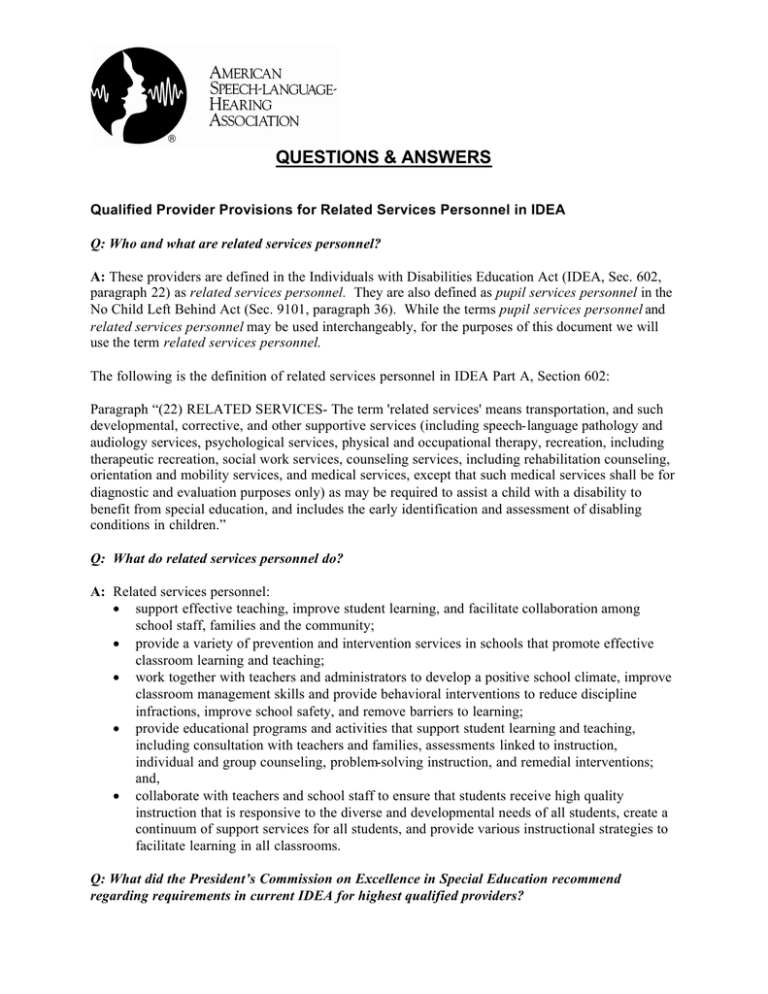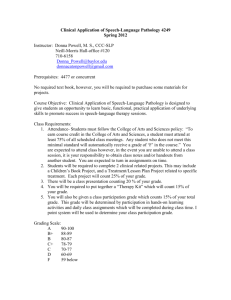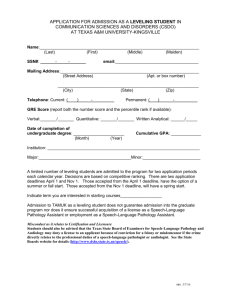Qualified Provider Provisions for Related Services Personnel in IDEA
advertisement

QUESTIONS & ANSWERS Qualified Provider Provisions for Related Services Personnel in IDEA Q: Who and what are related services personnel? A: These providers are defined in the Individuals with Disabilities Education Act (IDEA, Sec. 602, paragraph 22) as related services personnel. They are also defined as pupil services personnel in the No Child Left Behind Act (Sec. 9101, paragraph 36). While the terms pupil services personnel and related services personnel may be used interchangeably, for the purposes of this document we will use the term related services personnel. The following is the definition of related services personnel in IDEA Part A, Section 602: Paragraph “(22) RELATED SERVICES- The term 'related services' means transportation, and such developmental, corrective, and other supportive services (including speech-language pathology and audiology services, psychological services, physical and occupational therapy, recreation, including therapeutic recreation, social work services, counseling services, including rehabilitation counseling, orientation and mobility services, and medical services, except that such medical services shall be for diagnostic and evaluation purposes only) as may be required to assist a child with a disability to benefit from special education, and includes the early identification and assessment of disabling conditions in children.” Q: What do related services personnel do? A: Related services personnel: • support effective teaching, improve student learning, and facilitate collaboration among school staff, families and the community; • provide a variety of prevention and intervention services in schools that promote effective classroom learning and teaching; • work together with teachers and administrators to develop a positive school climate, improve classroom management skills and provide behavioral interventions to reduce discipline infractions, improve school safety, and remove barriers to learning; • provide educational programs and activities that support student learning and teaching, including consultation with teachers and families, assessments linked to instruction, individual and group counseling, problem-solving instruction, and remedial interventions; and, • collaborate with teachers and school staff to ensure that students receive high quality instruction that is responsive to the diverse and developmental needs of all students, create a continuum of support services for all students, and provide various instructional strategies to facilitate learning in all classrooms. Q: What did the President’s Commission on Excellence in Special Education recommend regarding requirements in current IDEA for highest qualified providers? A: The Commission chose not to make any comments on the qualifications and training of related services personnel under IDEA. Q: Why have two different standards for teachers and related services personnel? A: “Highly qualified” in the No Child Left Behind Act applies to teachers only and requires them to have a Bachelor of Arts in the field they are teaching in order to be identified as highly qualified. The “qualified provider” provisions in IDEA requires states to maintain standards for professionals who are providing special education related services in schools that are identical to the standards found in any other setting in which these services would be delivered. Since teachers only deliver their services in schools, there is no need to have standards for outside of the school. However, since the professions that deliver related servic es do so in numerous settings (schools, clinics, hospitals, rehab centers, private homes) and through various means (Medicaid, Medicare, Tricare, IDEA, vocational rehabilitation, private insurance, etc.), states have found the need to regulate the entire profession. Prior to the 1985 reauthorization of IDEA, there was no requirement that schools hire qualified related services personnel. Since the 1985 reauthorization, some school groups have labeled uniform standards as excessive, unattainable , and expensive. Q: What is the difference between someone who has only received their bachelor’s degree in a field and a master’s degree for related services? A: Most undergraduate programs (i.e., pre-med, pre-law, political science, occupational therapy, speech-language pathology) are pre-professional programs that are not designed to prepare their graduates to practice in the field. They focus on mastery of basic knowledge but provide little if any clinical practice. For example, an undergraduate student in a speech-language pathology program may not be required to have any clinical experience under the supervision of an experienced, certified and licensed professional in order to receive their bachelor’s degree. In addition to an additional 2 years of advanced course work in current diagnosis and treatment practices, a graduate student in speech-language pathology is required to have over 300 hours of supervised clinical practice before graduation. Q: What is wrong with removing the language from current law and replacing it with the language in H.R. 1350? A: The IDEA qualified provider requirements speak to the entry-level requirements of a particular profession or discipline in a state. States currently have the authority to set the requirements for related services personnel. States, schools and the professions that deliver related services in schools have operated under this system for nearly two decades. By changing current law there would be no standard by which to measure the quality of personnel de livering services in the schools. There would be no accountability to the federal government for the $9+ billion spent annually on special education for these services and there would be no accountability to parents of children with disabilities on the quality of the personnel helping their children. In addition, individuals who have been licensed or certified in their state could be thrust into a chaotic professional environment. Imagine an education system with hundreds of certified professions of varying degrees of skill and quality. There would be no system for schools or parents to judge the efficacy and quality of the service they are expecting to receive based upon the person supplying those services. Under current law, parents can have a degree of confidence in the qualifications of the related service provider helping their child. With the changes in H.R.1350, parents would have no way of knowing what the qualifications are of the special education personnel in the schools. 2


